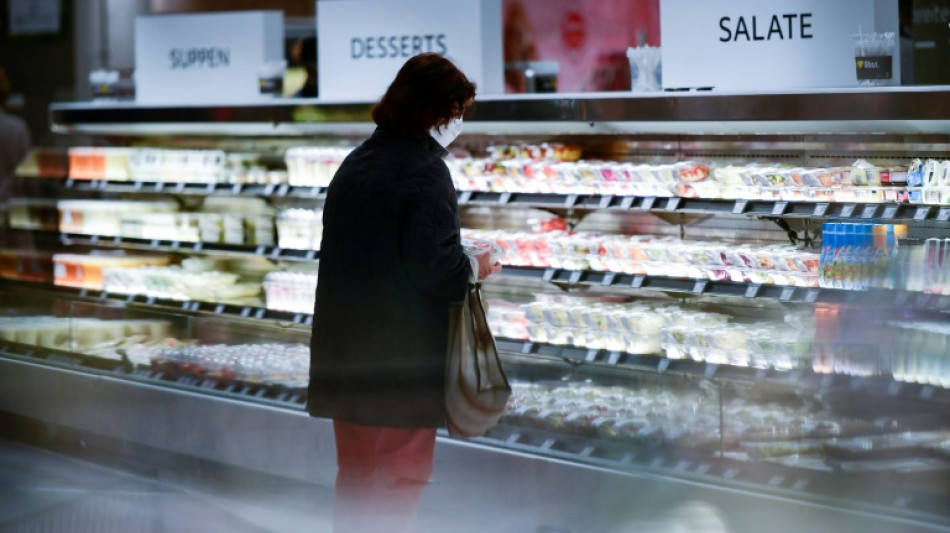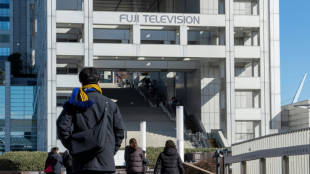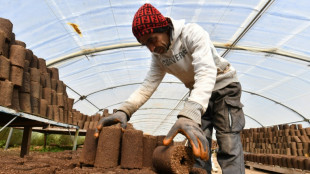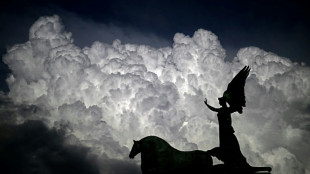
-
 French court hands Le Pen five-year election ban
French court hands Le Pen five-year election ban
-
Probe accuses ex J-pop star Nakai of sexual assault

-
 Japan leads hefty global stock market losses on tariff woes
Japan leads hefty global stock market losses on tariff woes
-
Saka 'ready to go' after long injury lay-off: Arteta

-
 Ingebrigtsen Sr, on trial for abusing Olympic champion, says he was 'overly protective'
Ingebrigtsen Sr, on trial for abusing Olympic champion, says he was 'overly protective'
-
Tourists and locals enjoy 'ephemeral' Tokyo cherry blossoms

-
 Khamenei warns of 'strong' response if Iran attacked
Khamenei warns of 'strong' response if Iran attacked
-
France fines Apple 150 million euros over privacy feature

-
 UK PM urges nations to smash migrant smuggling gangs 'once and for all'
UK PM urges nations to smash migrant smuggling gangs 'once and for all'
-
Thai authorities probe collapse at quake-hit construction site

-
 France's Le Pen convicted in fake jobs trial
France's Le Pen convicted in fake jobs trial
-
Chinese tech giant Huawei says profits fell 28% last year

-
 Trump says confident of TikTok deal before deadline
Trump says confident of TikTok deal before deadline
-
Myanmar declares week of mourning as hopes fade for quake survivors

-
 Japan's Nikkei leads hefty market losses, gold hits record
Japan's Nikkei leads hefty market losses, gold hits record
-
Tears in Taiwan for relatives hit by Myanmar quake

-
 Venezuela says US revoked transnational oil, gas company licenses
Venezuela says US revoked transnational oil, gas company licenses
-
'Devastated': Relatives await news from Bangkok building collapse

-
 Arsenal, Tottenham to play pre-season North London derby in Hong Kong
Arsenal, Tottenham to play pre-season North London derby in Hong Kong
-
Japan's Nikkei leads hefty equity market losses; gold hits record

-
 Israel's Netanyahu picks new security chief, defying legal challenge
Israel's Netanyahu picks new security chief, defying legal challenge
-
Trump says US tariffs to hit 'all countries'

-
 Prayers and tears for Eid in quake-hit Mandalay
Prayers and tears for Eid in quake-hit Mandalay
-
After flops, movie industry targets fresh start at CinemaCon

-
 Tsunoda targets podium finish in Japan after 'unreal' Red Bull move
Tsunoda targets podium finish in Japan after 'unreal' Red Bull move
-
French chefs await new Michelin guide

-
 UK imposes travel permit on Europeans from Wednesday
UK imposes travel permit on Europeans from Wednesday
-
At his academy, Romanian legend Hagi shapes future champions

-
 Referee's lunch break saved Miami winner Mensik from early exit
Referee's lunch break saved Miami winner Mensik from early exit
-
Djokovic refuses to discuss eye ailment after shock Miami loss

-
 Mitchell magic as Cavs bag 60th win, Pistons and T'Wolves brawl
Mitchell magic as Cavs bag 60th win, Pistons and T'Wolves brawl
-
Mensik shocks Djokovic to win Miami Open

-
 Duterte lawyer: 'compelling' grounds to throw case out
Duterte lawyer: 'compelling' grounds to throw case out
-
What happens on Trump's 'Liberation Day' and beyond?

-
 Clock ticks on Trump's reciprocal tariffs as countries seek reprieve
Clock ticks on Trump's reciprocal tariffs as countries seek reprieve
-
Japan-Australia flagship hydrogen project stumbles

-
 Musk deploys wealth in bid to swing Wisconsin court vote
Musk deploys wealth in bid to swing Wisconsin court vote
-
Mensik upsets Djokovic to win Miami Open

-
 China manufacturing activity grows at highest rate in a year
China manufacturing activity grows at highest rate in a year
-
'Waited for death': Ex-detainees recount horrors of Sudan's RSF prisons

-
 Japan's Nikkei leads big losses in Asian markets as gold hits record
Japan's Nikkei leads big losses in Asian markets as gold hits record
-
Rescue hopes fading three days after deadly Myanmar quake

-
 'Basketbrawl' as seven ejected in Pistons-Wolves clash
'Basketbrawl' as seven ejected in Pistons-Wolves clash
-
Four men loom large in Microsoft history

-
 Computer pioneer Microsoft turns 50 in the age of AI
Computer pioneer Microsoft turns 50 in the age of AI
-
Trump calls out both Putin and Zelensky over ceasefire talks

-
 Kim Hyo-joo tops Vu in playoff to win LPGA Ford Championship
Kim Hyo-joo tops Vu in playoff to win LPGA Ford Championship
-
Economy and especially Trump: Canadians' thoughts on campaigns

-
 Liberal PM Carney takes lead four weeks before Canada vote
Liberal PM Carney takes lead four weeks before Canada vote
-
SpaceX to launch private astronauts on first crewed polar orbit


Ukraine war drives German inflation, darkens growth outlook
Inflation in Germany has surged to a post-reunification high, data showed Wednesday, as the war in Ukraine sent energy prices soaring and diminished the prospects for growth in Europe's largest economy.
Consumer prices rose in March by 7.3 percent year-on-year, according to the federal statistics agency Destatis, up from 5.1 percent in February and the highest level since the modern German state was created in 1990.
Russia's invasion of Ukraine had sent prices for oil and gas soaring and had a "considerable impact on the high rate of inflation", Destatis said in a statement.
Elevated prices for energy would take a toll on growth in Germany, a panel of the government's economic advisers said, slashing their output forecast for 2022.
The German Council of Economic Experts said it now expected gross domestic product (GDP) to expand by just 1.8 percent year-on-year, down from its previous estimate of 4.6 percent.
The conflict in Ukraine was "drastically worsening the economic outlook," they said in their latest report.
The experts, whose forecasts are closely watched by Chancellor Olaf Scholz's government, said they saw inflation reaching a decades-high peak of 6.1 percent in 2022, with supply chain disruptions adding to the pressure on prices from rising energy costs.
- Russian energy -
The Ukraine conflict has derailed Germany's hopes of finally shaking off the coronavirus pandemic and roaring back to growth.
With its export-oriented industries, Germany has been particularly vulnerable to the supply chain bottlenecks and raw material shortages caused by the pandemic, and its recovery has lagged that of other major European economies like France and Italy.
"The war is putting additional strain on supply chains already strained by the coronavirus pandemic," said expert panel member Achim Truger.
"At the same time, the prices for natural gas and oil, which have risen sharply once again, are weighing on companies and private consumption."
Like many of its neighbours in Europe, Germany is highly reliant on supplies of Russian oil and gas to power its industry and heat its homes.
Berlin has vowed to wean itself off Russian energy in the near future, by turning to suppliers in other countries and accelerating a shift towards renewables.
But Scholz's government has resisted calls at home and abroad to boycott Russian energy, fearing it would have a devastating impact on the economy.
- Government support -
The last time Germany recorded such a high rate of inflation was in the autumn of 1981, when oil prices increased sharply because of the Iran-Iraq war, Destatis said.
In Spain, too, inflation reached a level in March not seen in almost 37 years, jumping to 9.8 percent from 7.6 percent in February.
Inflation was already elevated across the eurozone before the outbreak of the Ukraine conflict, sitting at 5.8 percent in February -- significantly above the European Central Bank's two-percent target.
With the war continuing to put pressure on prices the only way for inflation in Germany was "up" with the possibility the rate could enter "double-digit territory", according to Carsten Brzeski, head of macro at the ING bank.
A survey by the German Ifo institute, also published Wednesday, showed "more and more companies are planning to raise their prices over the next three months".
Consumers have to prepare for "sharp price increases", the Munich-based think tank said, with food retailers in particular expecting rises, as the war drives up the cost of agricultural imports.
Germany's three largest unions, IG Metall, IG BCE and IG BAU, earlier in the week called on the government to provide support for particularly energy intensive industries.
In March, the cost of household energy and motor fuels rose by 39.5 percent year-on-year, according to Destatis, while food prices increased 6.2 percent.
F.Dubois--AMWN

